#st. ignatius of loyola
Text
“It is dangerous to make everybody go forward by the same road: and worse to measure others by oneself.”
- St. Ignatius of Loyola
136 notes
·
View notes
Text
The silent “and”

“Pray as though everything depended on God. Work as though everything depended on you.”
This gets attributed to a lot of sources – St. Ignatius of Loyola, the Talmud, Martin Luther, Dave Ramsey – and even St. Augustine of Hippo (today’s saint).
Whoever said it? It really doesn’t matter. Because it’s true. And extremely Catholic.
What makes it Catholic? Its “both/and-ness.”
“Both/and-ness” is one of the marks of the Catholic Church. At her best, the Church doesn’t elevate one positive good at the expense of losing another positive good. Here’s what I mean.
When it comes to “Pray as though everything depended on God. Work as though everything depended on you,” the Church sees the silent “and” between the sentences. And says it out loud.
But if you ask which is better – doing what I know to do, the best I know how, or relying completely on God?
The Church’s answer would be, “Yes. Both are positive goods.”
The key to this (or any of the other “both/ands”) is seeking God’s will. Letting God lead. Keeping God on the throne. By making sure that the positive goods themselves become the focus.
The only way I know how to do this?
Pray for God’s guidance. Listen and follow the movement of the Holy Spirit – even if it’s not where you thought you would be headed.
Give it to God. Trust that God will ensure the right outcome – even if it’s not your preferred outcome.
Ask God to let His will be done. Trust that God will work it all for your good – even if that means killing it dead.
And do what you know to do, the best you know how.
This isn’t a one-and-done. This has to be done each and every step of the way.
Give it to God. And keep giving it to God.
Do what you know to do, the best you know how. And keep doing it.
When you do, you’ll end up exactly where you’re supposed to be.
And you’ll do it in God’s peace every step of the way.
Even if it’s not where you thought you’d be.
Today’s Readings
#Pray#Work#God#Jesus#Catholic#Christian#Church#Both-And#God's Will#God's Peace#St. Augustine#St. Ignatius of Loyola#Moments Before Mass
39 notes
·
View notes
Text
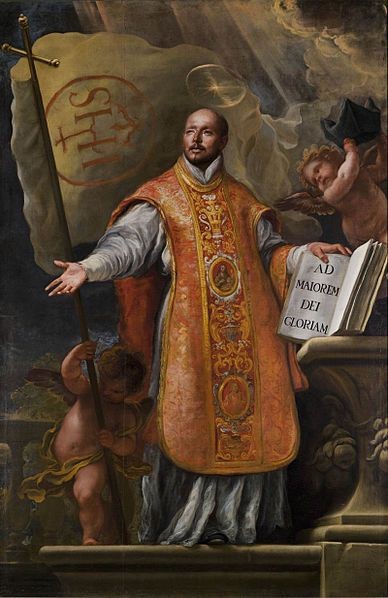
This appears to be a baroque Catholic religious painting of St. Ignatius of Loyola. I don't know who the artist is.
#traditional catholicism#traditional catholic images#traditional catholic baroque religious painting#traditional catholic saints#traditional catholic saints images#st. ignatius of loyola#the founder of the jesuit order#jesuit priest#jesuit saints
8 notes
·
View notes
Photo

St. Ignatius Church through the trees on Charles Square, Prague (infrared photography)
The church was designed by Carlo Lurago in the early Baroque style, and built between 1655 and 1677. The church was built as part of the new Nove Mesto residence of the city's Jesuits, the third largest Jesuit complex in Europe, and dedicated to their patron saint and founder of the Jesuit Order, St. Ignatius of Loyola.
The top of the facade carries a statue of St. Ignatius Loyola, placed there in 1671, with a halo surrounding his whole body. This feature was considered controversial at the time it was installed, as such a decoration was only considered appropriate for statues of Jesus Christ.
#photographers on tumblr#original photographers#black and white#infrared photography#trees#church#st. ignatius church#kostel svatého ignáce z loyoly#karlovo náměstí#charles square#st. ignatius of loyola#jesuits#praha#prague#baroque#infrared
72 notes
·
View notes
Text

Source of picture: https://bkbro69.tumblr.com
“Teach us to give and not to count the cost.” Saint Ignatius of Loyola
#St. Ignatius of Loyola#quotes#Teach us to give and not to count the cost#teach us to give#teach#give#not count the cost#God#Jesus#Christ#Jesus Christ#Father#Son#Holy Spirit#Holy Trinity#christian religion#faith#hope#love#stress reliever
12 notes
·
View notes
Text
SAINT OF THE DAY (July 31)
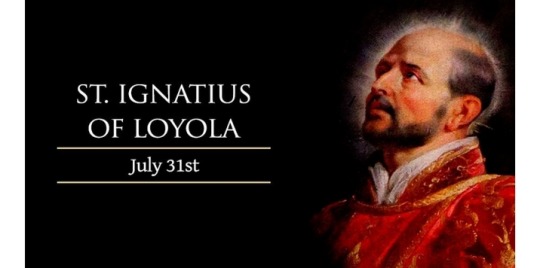
On July 31, the Universal Church marks the feast day of St. Ignatius of Loyola.
The Spanish saint is known for founding the Society of Jesus, also known as the Jesuits, as well as for creating the “Spiritual Exercises” often used today for retreats and individual discernment.
St. Ignatius was born into a noble family on 23 October 1491 in Guipuzcoa, Spain. He served as a page in the Spanish court of Ferdinand and Isabella.
He then became a soldier in the Spanish army and wounded his leg during the siege of Pamplona in 1521.
During his recuperation, he read “Lives of the Saints.”
The experience led him to undergo a profound conversion, and he dedicated himself to the Catholic faith.
After making a general confession in a monastery in Montserrat, St. Ignatius proceeded to spend almost a year in solitude.
He wrote his famous “Spiritual Exercises” and then made a pilgrimage to Rome and the Holy Land, where he worked to convert Muslims.
St. Ignatius returned to complete his studies in Spain and then France, where he received his theology degree.
While many held him in contempt because of his holy lifestyle, his wisdom and virtue attracted some followers, and the Society of Jesus was born.
The Society was approved by Pope Paul III in 1540, and it grew rapidly.
St. Ignatius remained in Rome, where he governed the Society and became friends with St. Philip Neri.
St. Ignatius died on 31 July 1556, probably of the "Roman Fever," a severe variant of malaria that was endemic in Rome throughout medieval history.
An autopsy revealed that he also had kidney and bladder stones, a probable cause of the abdominal pains he suffered from in later life.
He was beatified by Pope Paul V on 27 July 1609 and was canonized by Pope Gregory XV on 12 March 1622.
The Jesuits remain numerous today, particularly in several hundred universities and colleges worldwide.
On 22 April 2006, Pope Benedict XVI presided over a Eucharistic concelebration for the Society of Jesus.
He addressed the fathers and brothers of the Society present at the Vatican Basilica, calling to mind the dedication and fidelity of their founder.
“St. Ignatius of Loyola was first and foremost a man of God who in his life put God, his greatest glory and his greatest service, first,” the Pope said.
“He was a profoundly prayerful man for whom the daily celebration of the Eucharist was the heart and crowning point of his day.”
“Precisely because he was a man of God, St Ignatius was a faithful servant of the Church,” Benedict continued, "recalling the saint's special vow of obedience to the Pope, which he himself describes as 'our first and principal foundation.”
Highlighting the need for “an intense spiritual and cultural training,” Pope Benedict called upon the Society of Jesus to follow in the footsteps of St. Ignatius.
They should continue his work of service to the Church and obedience to the Pope so that its members “may faithfully meet the urgent needs of the Church today.”
8 notes
·
View notes
Text
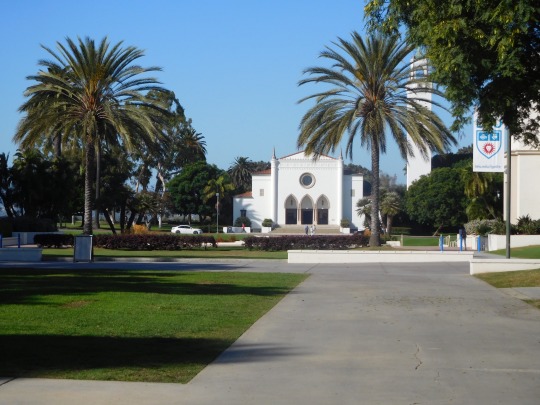
2 notes
·
View notes
Photo

(via urbanhermit)
8 notes
·
View notes
Text
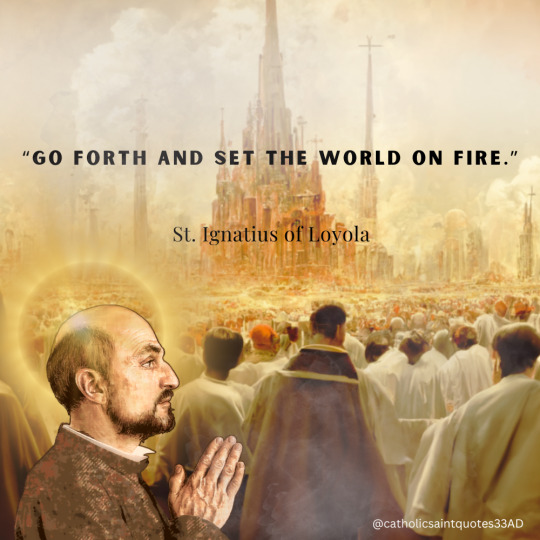
🔥Saint Ignatius, Ora Pro Nobis🔥
#saint ignatius#st. ignatius of loyola#St. Ignatius Quotes#Ora pro nobis#feast day#latin mass#sspx#liturgical calendar#tridentine#tridentine mass#catholic#roman catholic#loyola#fire#on fire#poetry#original art#original content
8 notes
·
View notes
Text
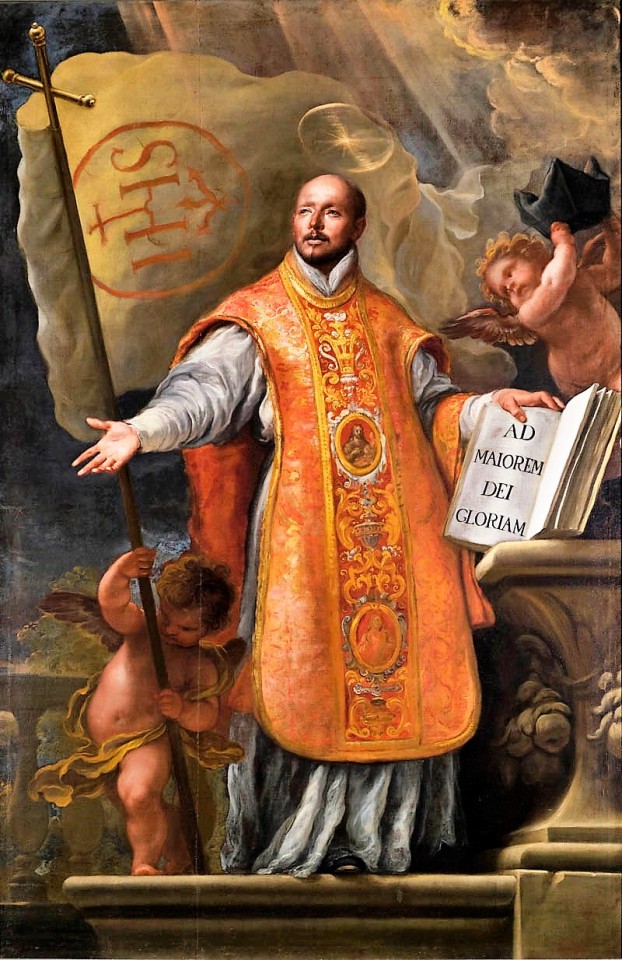
#catholicism#feast day#catholic church#roman catholic#catholic#st. ignatius of loyola#Ignatius of Loyola#pray for us
20 notes
·
View notes
Text
“Charity and kindness unwedded to truth are not charity and kindness, but deceit and vanity.”
- St. Ignatius of Loyola
26 notes
·
View notes
Text
What St. Ignatius of Loyola Teaches Us Today
Fr. Paul K. Rourke, S.J.
Vice President for Mission and Ministry
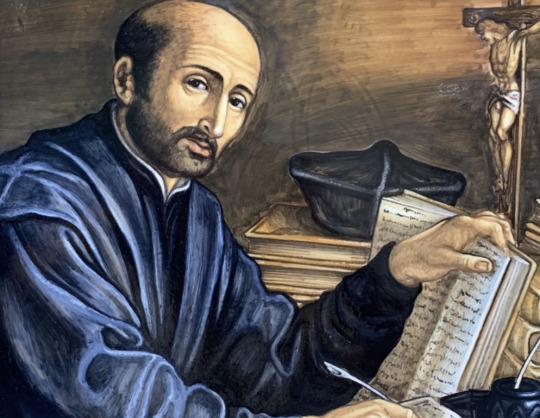
Today we celebrate the Feast of St. Ignatius of Loyola, commemorating July 31, 1556 when he entered into eternal life. With the growth of the Society of Jesus and spread of its institutions across the globe over close to five centuries, his legacy and impact have only grown in importance. As heirs of that legacy we continue to unpack the spiritual and pedagogical riches given by God to Ignatius for the benefit of the Church and the world.
Which of those riches is most helpful to us today? While many people would offer a different answer, I think we can learn most from Ignatius’s ability to discern a path forward in a time of conflict, controversy, and danger. Ignatius lived in a time of near-constant war and religious conflict. (His own conversion was precipitated by a near-mortal wound from one of those wars.) The Church had yet to reform, and was reeling from the attacks of Martin Luther and Henry VIII’s break with the papacy. Political and economic freedom, or anything we would recognize as justice in the civil or social sphere were non-existent. In other words, the crises faced by Ignatius and his companions, as they founded the Society of Jesus, were no less daunting than the ones we confront today. As a university founded in the darkest days of World War II, we seem to have drawn inspiration from their courageous leap of faith.
No one needs reminding of the crises we face today. We feel besieged by a world seemingly more divided and dangerous than ever. Ignatius may not offer answers, but the discerning path he offers is a hopeful one. He remained a pilgrim throughout his life, and the spirituality he offers each of us is a pilgrim’s spirituality—i.e. a spirituality for people on an often arduous and confusing journey. As a pilgrim, he was frequently uncertain of the next step, but never of the destination: he knew that God was that destination, and that Jesus accompanied him along the path and was the path in the truest sense. The firm conviction, born of experience, that God lay ahead of him, and that Jesus accompanied him, allowed Ignatius to confront many dangers with courage and serenity.
Similarly, in facing controversy and conflict, Ignatius wisely counseled his followers to go to the deeper roots of that conflict by addressing the underlying spiritual malaise and corruption besetting the Church. Perhaps in our own time we can learn from him by spending less effort focusing on which camp we belong to, or which argument will carry the day, and more on the nagging sickness at the heart of a world so alienated from itself.
#St. Ignatius of Loyola#Feast Day of St. Ignatius of Loyola#Fr. Paul K. Rourke#S.J.#Society of Jesus#Fairfield University#Jesuits#Spirituality
0 notes
Text
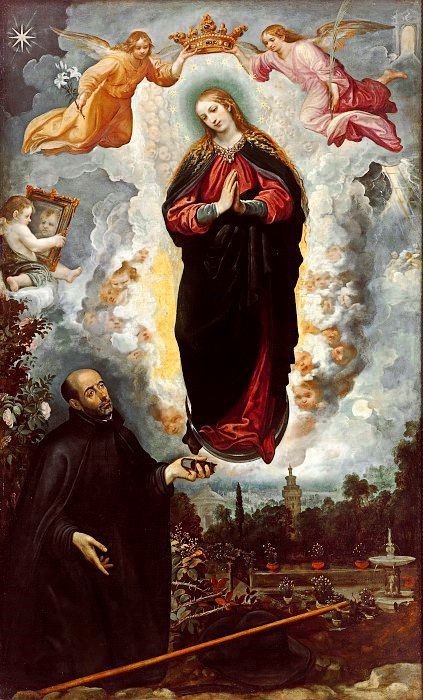
A renaissance era Catholic religious art image of the Coronation of the Blessed Virgin Mary in a vision to St. Ignatius of Loyola, the founder of the Jesuit Order. The fifth Glorious Mystery of the Most Holy Rosary. Artist unknown.
#traditional catholicism#traditional catholic images#traditional catholic renaissance religious art#traditional catholic marian devotion#traditional catholic marian images#the blessed virgin mary#traditional catholic saints#traditional catholic saints images#st. ignatius of loyola#founder of jesuit order#the most holy rosary devotional and sacramental#the fifth glorious mystery of the most holy rosary#the cornation of the blessed virgin mary
26 notes
·
View notes
Quote
This active self-control, which formed the end of the exercitia of St. Ignatius and of the rational monastic virtues everywhere, was also the most important practical ideal of Puritanism. In the deep contempt with which the cool reserve of its adherents is contrasted, in the reports of the trials of its martyrs, with the undisciplined blustering of the noble prelates and officials can be seen that respect for quiet self-control which still distinguishes the best type of English or American gentleman to-day. To put it in our terms: The Puritan, like every rational type of asceticism, tried to enable a man to maintain and act upon his constant motives, especially those which it taught him itself, against the emotions. In this formal psychological sense of the term it tried to make him into a personality. Contrary to many popular ideas, the end of this asceticism was to be able to lead an alert, intelligent life: the most urgent task the destruction of spontaneous, impulsive enjoyment, the most important means was to bring order into the conduct of its adherents. All these important points are emphasized in the rules of Catholic monasticism as strongly as in the principles of conduct of the Calvinists. On this methodical control over the whole man rests the enormous expansive power of both, especially the ability of Calvinism as against Lutheranism to defend the cause of Protestantism as the Church militant.
Max Weber, The Protestant Ethic
0 notes
Text
"Go forth and set the world on fire." –St. Ignatius of Loyola
0 notes
Text
The Nightly Examen, Following St. Ignatius:
Place yourself in God's presence.
Pray to understand how God is active in your life.
Recall your day, specifically your faults
Reflect on what you did, said, or thought in those instances.
Look toward tomorrow, figure out how you can improve.
Conclude with an Our Father.
#st Ignatius#st ignatius of loyola#jesuits#Ignation examen#the examen#nightly prayer#prayer#reflection#praying#religion#Catholic#Christian#Christianity#catholicism#catholic church#cristiandad#catolica#catolico#catolicismo#iglesia#iglesia católica#god#jesus
113 notes
·
View notes